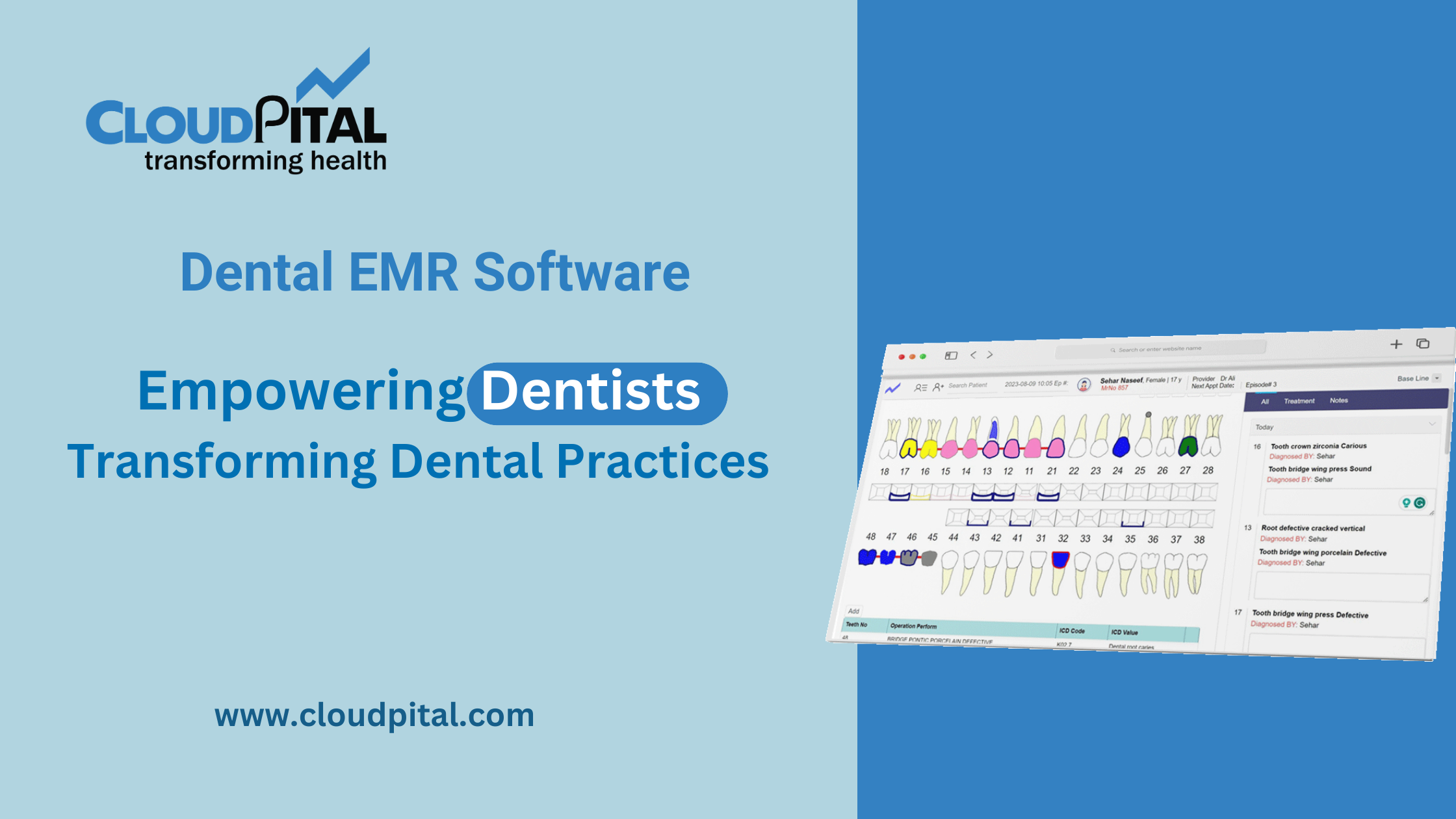Cloudpital # 1 is one of the top Hospital Software in Saudi Arabia the use of telecommunication technology to provide healthcare services remotely, has become increasingly important in Saudi Arabia. The Kingdom’s healthcare sector has embraced telemedicine as a means to enhance access to medical care, especially in remote and underserved areas. Hospital software systems play a crucial role in enabling and supporting telemedicine services. This essay explores how these systems facilitate telemedicine, focusing on their features, benefits, and impact on healthcare delivery in Saudi Arabia.
Click to Start Whatsapp Chatbot with Sales
Mobile: +966547315697
Email: sales@cloudpital.com
Cloudpital # 1 Hospital Software in Saudi Arabia

Integration with Telemedicine Platforms
Seamless Communication
Hospital Software in Saudi Arabia integrate with telemedicine platforms to facilitate seamless communication between healthcare providers and patients.
- Video Consultations: Software systems support high-quality video consultations, enabling real-time interactions between doctors and patients.
- Chat and Messaging: Secure chat and messaging features allow for the exchange of text-based communication and sharing of medical information.
Scheduling and Appointment Management
Hospital software systems assist in scheduling and managing telemedicine appointments.
- Appointment Booking: Patients can book telemedicine appointments online, choosing convenient times and specialists.
- Reminders and Notifications: Automated reminders and notifications help reduce no-show rates and keep patients informed about their appointments.
Electronic Health Records (EHR) Integration
Access to Patient Records
Integration with Electronic Health Records (EHR) systems provides healthcare providers with access to comprehensive patient information during telemedicine consultations.
- Medical History: Providers can review a patient’s medical history, including previous diagnoses, treatments, and medications.
- Lab Results and Imaging: Access to lab results and imaging reports allows for informed decision-making and diagnosis.
Real-Time Data Sharing
EHR integration enables real-time sharing of patient data between healthcare providers and patients.
- Prescription Management: Providers can prescribe medications electronically and share prescriptions with patients and pharmacies.
- Data Updates: Any updates to the patient’s records during the consultation are automatically synchronized with the EHR system.
Secure Data Exchange and Privacy
Data Encryption
Hospital software systems use advanced encryption methods to secure data exchanged during telemedicine sessions.
- Secure Transmission: All data, including video, audio, and text, is encrypted during transmission to protect patient privacy.
- Data Storage: Patient data is stored securely in compliance with regulations, preventing unauthorized access.
Compliance with Regulations
These Hospital Software in Saudi Arabia ensure compliance with local and international healthcare regulations regarding data privacy and security.
- HIPAA Compliance: For international standards, systems often comply with the Health Insurance Portability and Accountability Act (HIPAA), ensuring data protection.
- Saudi Health Regulations: Compliance with Saudi-specific health regulations and data protection laws is crucial for legal and ethical telemedicine practice.

Enhanced Patient Engagement
Patient Portals
Dental Software in Saudi Arabia often include patient portals, which enhance patient engagement and self-management.
- Access to Health Information: Patients can access their health records, lab results, and treatment plans through the portal.
- Educational Resources: Portals provide access to educational materials and resources, helping patients understand their conditions and treatments.
Telehealth Monitoring
These systems support telehealth monitoring, allowing healthcare providers to track patients’ health remotely.
- Wearable Devices: Integration with wearable devices enables the collection of real-time health data, such as heart rate, blood pressure, and glucose levels.
- Alerts and Notifications: Automatic alerts and notifications can be set for critical health metrics, enabling timely intervention.
Benefits to Healthcare Providers and Patients
Improved Access to Care
Telemedicine services facilitated by hospital software systems improve access to healthcare, especially for patients in remote or underserved areas.
- Reduced Travel: Patients can consult with specialists without the need to travel, saving time and reducing costs.
- Expanded Reach: Healthcare providers can extend their services to a broader patient base, including those in rural areas.
Efficiency and Cost Savings
Telemedicine reduces the need for physical infrastructure and can lower operational costs.
- Reduced Overhead: Less reliance on physical office space and in-person visits reduces overhead costs for healthcare facilities.
- Efficient Resource Utilization: Telemedicine allows for better utilization of healthcare resources, including time and personnel.
Continuity of Care
Telemedicine enables continuous monitoring and management of chronic conditions, ensuring better continuity of care.
- Chronic Disease Management: Patients with chronic conditions can receive regular follow-up care and monitoring through telemedicine.
- Care Coordination: Hospital software systems support care coordination, ensuring that all healthcare providers involved in a patient’s care are informed and aligned.
Challenges and Solutions
Technical Challenges
The implementation of telemedicine services can face technical challenges, including connectivity issues and software integration.
- Reliable Internet Access: Ensuring reliable and high-speed internet access is essential for the success of telemedicine services.
- System Compatibility: Integrating various hospital software systems and telemedicine platforms can be complex and requires careful planning.
Data Privacy and Security
Protecting patient data is a major concern in telemedicine.
- Enhanced Security Measures: Implementing robust security measures, including encryption and secure authentication, is crucial.
- Patient Consent: Ensuring that patients understand and consent to the use of their data in telemedicine consultations is important for compliance and trust.
Regulatory and Legal Issues
Navigating the regulatory and legal landscape is a key challenge in implementing telemedicine services.
- Licensing and Credentialing: Healthcare providers must be appropriately licensed and credentialed to offer telemedicine services in different regions.
- Cross-Border Services: Providing telemedicine services across borders involves understanding and complying with international laws and regulations.
Future Trends and Innovations
Artificial Intelligence (AI) and Machine Learning
AI and machine learning are increasingly being integrated into hospital software systems to enhance telemedicine services.
- Predictive Analytics: AI can analyze patient data to predict health outcomes and assist in decision-making.
- Virtual Assistants: AI-powered virtual assistants can provide initial consultations and triage, improving efficiency.
Advanced Telehealth Devices
The use of advanced Inpatient Hospice in Saudi Arabia devices is expected to grow, providing more comprehensive remote monitoring capabilities.
- Remote Diagnostic Tools: Devices that can measure and transmit diagnostic information, such as ECGs and blood tests, will enhance remote care.
- Integrated Health Monitoring: Devices that integrate with hospital software systems can provide continuous monitoring and real-time data sharing.
Blockchain Technology
Blockchain technology offers potential solutions for securing patient data and ensuring transparency in telemedicine.
- Data Integrity: Blockchain can ensure the integrity and immutability of patient records, preventing unauthorized alterations.
- Secure Transactions: Blockchain can facilitate secure transactions, including payments and data sharing, in telemedicine services.
Conclusion
Hospital software systems play a vital role in supporting telemedicine services in Saudi Arabia, offering features that enhance communication, data access, and patient engagement. These systems provide significant benefits, including improved access to care, cost savings, and continuity of care. Despite challenges such as technical issues and data security concerns, the integration of advanced technologies and compliance with regulations ensures the successful implementation of telemedicine. As the healthcare sector continues to evolve, the role of hospital software systems in facilitating telemedicine will only grow, driving improvements in healthcare delivery and patient outcomes in Saudi Arabia.
Click to Start Whatsapp Chatbot with Sales
Mobile: +966547315697
Email: sales@cloudpital.com
Hospital Software in Saudi Arabia
Hospital Software in Saudi Arabia
Hospital Software in Saudi Arabia
Hospital Software in Saudi Arabia support telemedicine services similar software solutions prices were updated on 2025-06-16T01:46:14+00:00 in Saudi Arabia in Mecca, Medina, Riyadh, Khamis Mushait, Yanbu, Jeddah, Dammam, Unaizah, Uqair, Ha’il, Ta if, Al Bahah, Dhahran, King Abdullah Economic City, Najran, Diriyah, Qatif, Khafji, Jubail, Abqaiq, List of Cities and Towns in Saudi Arabia, Ras Tanura, Turubah, Jazan Economic City, Knowledge Economic City, Medina, Khobar, Abha, Tabuk, Saudi Arabia, similar software solutions prices were updated on 2025-06-16T01:46:14+00:00 We also provide in Saudi Arabia services solutions company in Hafar Al-Batin, Udhailiyah, Al-Awamiyah, Hofuf, Hautat Sudair, Buraidah, Tayma, Duba, ‘uyayna, Saihat, Al-Kharj, Al-ula, Jizan, Rumailah, Ar Rass, Arar, Shaybah, Al Majma’ah, Rabigh, Dhurma, Haradh, List of Saudi Cities by Gdp Per Capita, Badr, Sudair Industrial City, Baljurashi, Shaqraa, Al-Khutt, Habala, Ad Dawadimi, Dawadmi, Layla, similar software solutions prices were updated on 2025-06-16T01:46:14+00:00 Price is SAR 100 and this was updated on updated on 2025-06-16T01:46:14+00:00 similar Hospital Software in Saudi Arabia support telemedicine services software solutions prices were updated on 2025-06-16T01:46:14+00:00 in Saudi Arabia in Haql, Afif, Al-Abwa, Farasan, Al-Jaroudiya, Thadig, Al-Thuqbah, Al Wajh, Almardmah, Al-Zilfi, Muzahmiyya, Prince Abdul Aziz Bin Mousaed Economic City, Tharmada’a, Skaka, Um Al-Sahek, Sharurah, Tanomah, Bisha, Dahaban, Al Qunfudhah, Qurayyat, Saudi Arabia, Ha’ir, as Sulayyil, Al Lith, Turaif, Al-Gway’iyyah, Samtah, Wadi Ad-Dawasir, Az Zaimah, Safwa City, Jalajil, Harmah, Mastoorah, Hotat Bani Tamim, Jabal Umm Al Ru’us, Rafha, Qaisumah, Al-Ghat, Hajrah, Al-Hareeq. Excerpt: Jeddah (also spelled Jiddah, Jidda, or Jedda; Arabic: Jidda) is a Saudi Arabian city located on the coast of the Red Sea and is the major urban center of western Saudi Arabia similar software solutions prices were updated on 2025-06-16T01:46:14+00:00 Price is SAR 100 and this was updated on updated on 2025-06-16T01:46:14+00:00
7-24-2024



